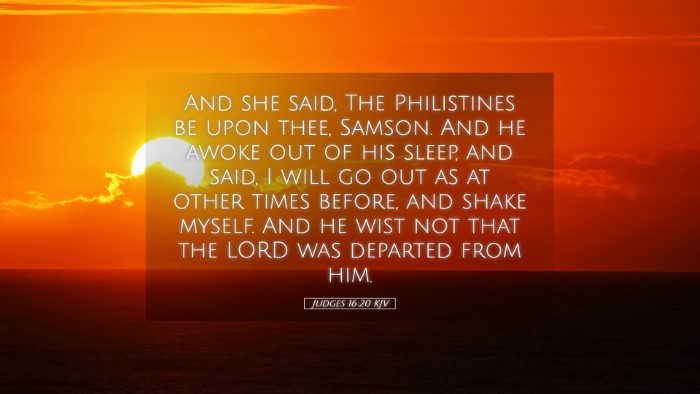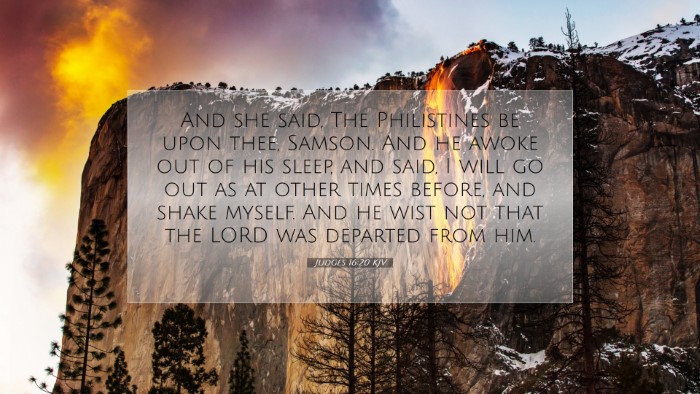Commentary on Judges 16:20
Judges 16:20 records a pivotal moment in the life of Samson:
"And she said, The Philistines be upon thee, Samson. And he awoke out of his sleep, and said, I will go out as at other times before, and shake myself. And he wist not that the Lord was departed from him."
Contextual Overview
This verse occurs towards the end of the narrative of Samson, the last judge of Israel before the establishment of the monarchy. The story focuses on his encounters with the Philistines, particularly through his relationships, most notably with Delilah.
Historical Background
The Israelites were under the oppression of the Philistines during this time, necessitating the raised leadership of judges. Samson's supernatural strength was derived from his Nazarite vow, which included not cutting his hair, refraining from consuming wine or unclean food, and abstaining from contact with the dead.
Thematic Considerations
-
Divine Abandonment: The phrase "he wist not that the Lord was departed from him" illustrates a profound theological theme: the consequences of disobedience. Samson's disregard for his covenant with God ultimately leads to his spiritual and physical downfall.
-
Power and Weakness: Samson's strength was linked to his relationship with God, and the verse underscores the irony of his situation. Even in his moment of greatest confidence, he is utterly unaware of the source of his strength having been removed due to his transgressions.
Commentary Insights
Matthew Henry notes that "Samson was careless, he slept in the lap of Delilah, and his danger was at the door." This indicates a broader principle regarding vigilance in the Christian life, cautioning against complacency in the face of spiritual threats.
Albert Barnes emphasizes the tragic irony of Samson's immediate response: "I will go out as at other times before." His habitual reliance on divine strength blinded him to the seriousness of his current condition. The same pattern can pervade modern Christian life; trusting past experiences rather than recognizing the necessity of continuous vigilance and dependence on God.
Adam Clarke points out the implication that God’s grace is not something to be taken for granted. "When the Spirit of God leaves us, our strength is as a spider's web." This aligns with the notion of how spiritual matters can be neglected until it is too late, as Samson exemplifies the folly of overconfidence in oneself.
The Spiritual Dimension
At the heart of this passage is a lesson about spiritual awareness. It serves as a somber warning that one can be active in the functions of faith (as Samson was in battling the Philistines) while being utterly disconnected from the source of that faith.
The phrase "the Philistines be upon thee" reflects wider spiritual truths about the hidden dangers that threaten believers when they stray from their commitments to the Lord. Samson’s quick dismissal of the warning indicates a lack of discernment and a tragic misplacement of trust.
Life Application
-
Awareness of God's Presence: Reflect on your own spiritual condition. Are there areas where complacency has crept in? Like Samson, individuals may overestimate their strength and underestimate their need for God's guidance.
-
Accountability: Surround yourself with trustworthy individuals who can speak truth into your life. Samson's solitude in his weakness led him into vulnerability; likewise, believers should seek genuine community for growth and protection.
-
Valuing Spiritual Integrity: Understand the long-term consequences of relational choices and character. Samson’s downfall directly relates to his alliances with those outside the covenant of faith.
Conclusion
Judges 16:20 resonates deeply with believers today as a reminder of the importance of spiritual vigilance, the necessity of remaining connected to God, and the tragic consequences of straying from His path. This verse not only reflects on a historical character but serves as an ongoing call to introspection and growth within our spiritual journeys.


